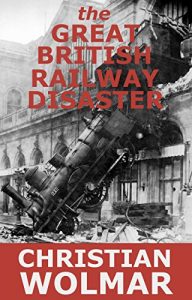As Britain’s railways were lurching into the private sector during the mid-1990s, Christian Wolmar – Britain’s leading transport commentator – documented their trials and tribulations, live in the pages of the Independent on Sunday. This book, presented as-is, without further updating, is the collection of those reports, published in 1996 in one volume.
“Why are the doors of trains being shut in the faces of passengers arriving slightly late from a connecting train? Why are some people paying more for the same journey because they bought their ticket from a machine rather than a ticket office? Why is it no longer possible to find complete timetable information at stations? Why have the residents of Bradford got a brand new train line but 30-year-old trains? Why have toilets at Bolton not been rebuilt? Why are residents living near the Kent coast line being woken up by trains all night? And why is there now a barrier down the middle of Southport station?
It is all, believe it or not, down to rail privatisation and the answers to all these questions, big and small, are in this book. For the past three years, the Government has been busy breaking up British Rail into over 100 parts and selling them off. The public has been confronted with a bewildering array of new logos, liveries and uniforms. New companies such as Railtrack have been created. Stations have become littered with new logos and staff have been split up between the various companies which means they can’t give information about their rivals. Competition rather than co-operation has become the prevailing ethos of the industry.
One of the Government’s own MPs, the late Robert Adley, called rail privatisation a ‘poll tax on wheels’. He was right. The process has been a catalogue of mishaps and gaffes. Since January 1995, the Independent on Sunday has published a weekly column on the trials and tribulations passengers have faced because of the changes on the railway. Its author, the paper’s transport correspondent, Christian Wolmar, is one of the leading commentators on transport. This collection of more than 60 items from the weekly column, updated and expanded, takes the reader through the whole story of rail privatisation in an entertaining and amusing way. The Government tells us that rail privatisation is supposed to make life better for the passenger. This book tells you otherwise.”
“Why are the doors of trains being shut in the faces of passengers arriving slightly late from a connecting train? Why are some people paying more for the same journey because they bought their ticket from a machine rather than a ticket office? Why is it no longer possible to find complete timetable information at stations? Why have the residents of Bradford got a brand new train line but 30-year-old trains? Why have toilets at Bolton not been rebuilt? Why are residents living near the Kent coast line being woken up by trains all night? And why is there now a barrier down the middle of Southport station?
It is all, believe it or not, down to rail privatisation and the answers to all these questions, big and small, are in this book. For the past three years, the Government has been busy breaking up British Rail into over 100 parts and selling them off. The public has been confronted with a bewildering array of new logos, liveries and uniforms. New companies such as Railtrack have been created. Stations have become littered with new logos and staff have been split up between the various companies which means they can’t give information about their rivals. Competition rather than co-operation has become the prevailing ethos of the industry.
One of the Government’s own MPs, the late Robert Adley, called rail privatisation a ‘poll tax on wheels’. He was right. The process has been a catalogue of mishaps and gaffes. Since January 1995, the Independent on Sunday has published a weekly column on the trials and tribulations passengers have faced because of the changes on the railway. Its author, the paper’s transport correspondent, Christian Wolmar, is one of the leading commentators on transport. This collection of more than 60 items from the weekly column, updated and expanded, takes the reader through the whole story of rail privatisation in an entertaining and amusing way. The Government tells us that rail privatisation is supposed to make life better for the passenger. This book tells you otherwise.”






